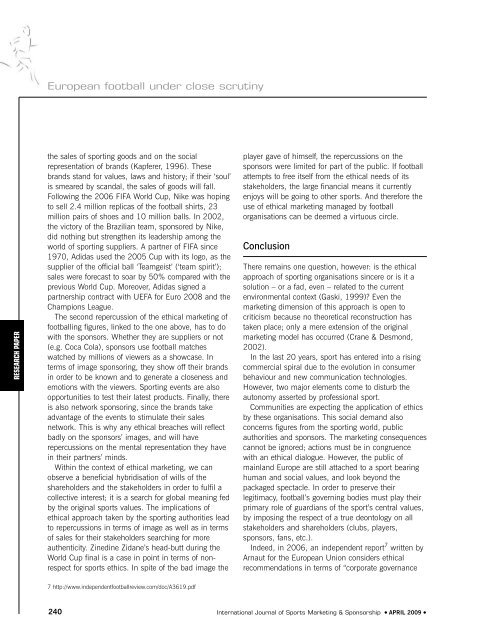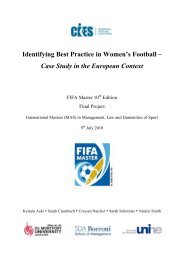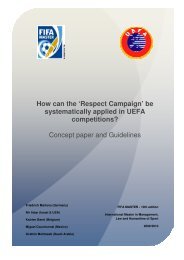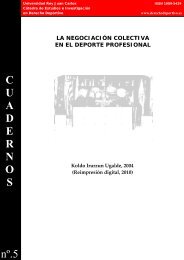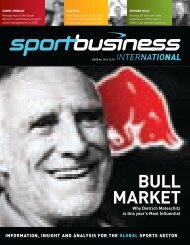Sports Marketing & Sponsorship - FIFA/CIES International University ...
Sports Marketing & Sponsorship - FIFA/CIES International University ...
Sports Marketing & Sponsorship - FIFA/CIES International University ...
- No tags were found...
Create successful ePaper yourself
Turn your PDF publications into a flip-book with our unique Google optimized e-Paper software.
European football under close scrutinyRESEARCH PAPERthe sales of sporting goods and on the socialrepresentation of brands (Kapferer, 1996). Thesebrands stand for values, laws and history; if their ‘soul’is smeared by scandal, the sales of goods will fall.Following the 2006 <strong>FIFA</strong> World Cup, Nike was hopingto sell 2.4 million replicas of the football shirts, 23million pairs of shoes and 10 million balls. In 2002,the victory of the Brazilian team, sponsored by Nike,did nothing but strengthen its leadership among theworld of sporting suppliers. A partner of <strong>FIFA</strong> since1970, Adidas used the 2005 Cup with its logo, as thesupplier of the official ball ‘Teamgeist’ (‘team spirit’);sales were forecast to soar by 50% compared with theprevious World Cup. Moreover, Adidas signed apartnership contract with UEFA for Euro 2008 and theChampions League.The second repercussion of the ethical marketing offootballing figures, linked to the one above, has to dowith the sponsors. Whether they are suppliers or not(e.g. Coca Cola), sponsors use football matcheswatched by millions of viewers as a showcase. Interms of image sponsoring, they show off their brandsin order to be known and to generate a closeness andemotions with the viewers. Sporting events are alsoopportunities to test their latest products. Finally, thereis also network sponsoring, since the brands takeadvantage of the events to stimulate their salesnetwork. This is why any ethical breaches will reflectbadly on the sponsors’ images, and will haverepercussions on the mental representation they havein their partners’ minds.Within the context of ethical marketing, we canobserve a beneficial hybridisation of wills of theshareholders and the stakeholders in order to fulfil acollective interest; it is a search for global meaning fedby the original sports values. The implications ofethical approach taken by the sporting authorities leadto repercussions in terms of image as well as in termsof sales for their stakeholders searching for moreauthenticity. Zinedine Zidane’s head-butt during theWorld Cup final is a case in point in terms of nonrespectfor sports ethics. In spite of the bad image theplayer gave of himself, the repercussions on thesponsors were limited for part of the public. If footballattempts to free itself from the ethical needs of itsstakeholders, the large financial means it currentlyenjoys will be going to other sports. And therefore theuse of ethical marketing managed by footballorganisations can be deemed a virtuous circle.ConclusionThere remains one question, however: is the ethicalapproach of sporting organisations sincere or is it asolution – or a fad, even – related to the currentenvironmental context (Gaski, 1999)? Even themarketing dimension of this approach is open tocriticism because no theoretical reconstruction hastaken place; only a mere extension of the originalmarketing model has occurred (Crane & Desmond,2002).In the last 20 years, sport has entered into a risingcommercial spiral due to the evolution in consumerbehaviour and new communication technologies.However, two major elements come to disturb theautonomy asserted by professional sport.Communities are expecting the application of ethicsby these organisations. This social demand alsoconcerns figures from the sporting world, publicauthorities and sponsors. The marketing consequencescannot be ignored; actions must be in congruencewith an ethical dialogue. However, the public ofmainland Europe are still attached to a sport bearinghuman and social values, and look beyond thepackaged spectacle. In order to preserve theirlegitimacy, football’s governing bodies must play theirprimary role of guardians of the sport’s central values,by imposing the respect of a true deontology on allstakeholders and shareholders (clubs, players,sponsors, fans, etc.).Indeed, in 2006, an independent report 7 written byArnaut for the European Union considers ethicalrecommendations in terms of “corporate governance7 http://www.independentfootballreview.com/doc/A3619.pdf240 <strong>International</strong> Journal of <strong>Sports</strong> <strong>Marketing</strong> & <strong>Sponsorship</strong> ● APRIL 2009 ●


